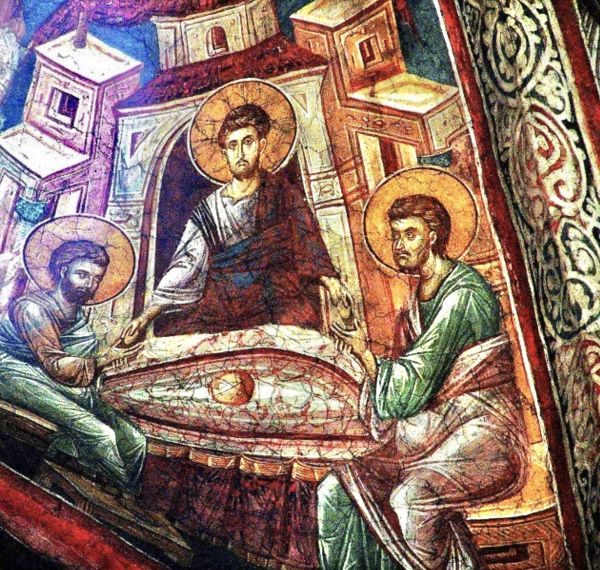The Risen Jesus came alongside the disciples of Emmaus who were conversing with Him about what had happened in Jerusalem. He put them to the test.
The body of Christ was now in a new, glorious condition while retaining its identity. To recognise Him required the faith and freedom of God's children.
For Francis, poverty and freedom of spirit combined with faith were the fundamental framework of his existential parable as a "minor".
Asking for alms, for example, even at Easter time, living the condition of a wayfarer on a journey, was for him an admirable exercise of the aforementioned values.
Leafing through the Sources, in the Major Legend, we read:
"Once, on the holy day of Easter, since he was in a hermitage very far from the town and there was no possibility of going begging, mindful of the One who on that same day appeared to the disciples on the road to Emmaus, in the figure of a pilgrim, he asked for alms, as a pilgrim and poor man, from his own brothers.
As he received it, he taught them with holy discourses to continually celebrate the Passover of the Lord, passing through the desert of the world in poverty of spirit and as pilgrims and strangers and as true Jews.
For in begging alms he was not driven by the lust for gain, but by the freedom of the Spirit. God, the father of the poor, showed a special solicitude for him" (FF 1129).
And it was that inner freedom together with faith that became the door of recognition of the Risen Christ at the breaking of the bread, as at Emmaus.
Francis had three-dimensional eyes, enabling him to go beyond appearances, grasping the substance of the message before him.
Indeed, in the Admonitions, he expresses himself thus:
"Behold, every day he humbles himself, as when from the royal seat he descended into the Virgin's womb; every day he himself comes to us in humble appearance [...].
And as he showed himself to the holy apostles in the true flesh, so also now he shows himself to us in the consecrated bread.
And just as they with the eyes of their body saw only the flesh of him, but contemplating him with the eyes of the spirit, they believed that he was the same God, so we too, seeing the bread and wine with the eyes of the body, must see and firmly believe that this is his most holy body and blood, living and true" (FF 144).
The Poverello had acquired, by grace, the interior capacity to decipher the footsteps of the Lord in the ordinary of days, with true concreteness.
«And it came to pass that when he was set at table with them, he took bread, pronounced the blessing, and broke it, and gave it to them. Now their eyes were opened and they recognised him» (Lk 24:30-31)
Wednesday between the Easter octave (Lk 24:13-35)












